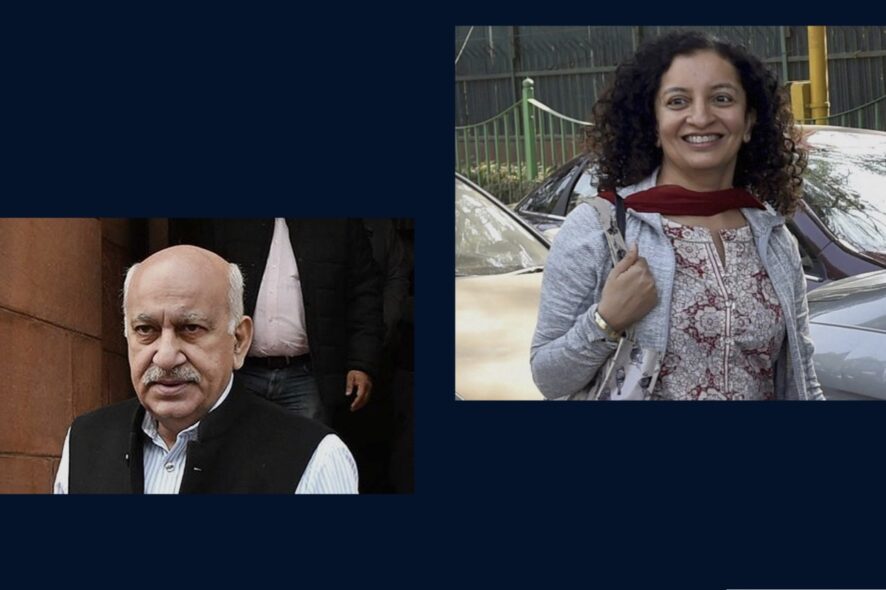Rouse Avenue Court, New Delhi: Ravindra Kumar Pandey, ACMM, in an essentially significant decision revolving around the #MeToo movement, acquitted Priya Ramani (accused) and held that no case under Section 500 of the Penal Code, 1860 was found against her.
“Most of the women who suffer abuse do not speak up about it or against it for simple reason “The Shame” or the social stigma attached.”
“The woman has a right to put her grievance at any platform of her choice and even after decades.”
What led to the filing of the present complaint under Section 500 IPC?
Complainant MJ Akbar, who was a politician moved the present complaint alleging accused Priya Ramani, a Journalist for defaming and damaging the complainant’s reputation by way of tweets, articles, etc. While presenting the set of allegations, complainant stated that the accused had made false, derogatory and malicious imputations against him such as:
I began this piece with my MJ Akbar story. Never named him because he didn’t ‘do’ anything. Lots of women have worse stories about this predator maybe they’ll share’, ‘ the media’s biggest sexual predator’. ‘ How many more stories do you need to hear?’, ‘Am glad # MJ Akbar won’t be in the workplace any more but Akbar represent countless men who believe they can say and do whatever they want to women without any consequences’. ‘You’re an expert on obscene phone calls, texts, inappropriate compliments and not taking no for an answer’.
Another allegation that the complainant puts forward is the accused herself, while putting forward the above mentioned quoted defamatory statements, relating to an incident occurred 20 years ago, admits that the complainant did not do anything to her.
Allegations of the Accused as: Figment of her imagination
Complainant goes on to submit that accused’s conduct on taking any action before any authority, with respect to the alleged incident clearly belies the sanctity of the articles and allegation made against the complainant with the intention to malign his reputation.
It was further alleged by the complainant that accused Priya Ramani had resorted to a series of maliciously fabricated allegations, which was diabolically and viciously spread by her by using media.
All of the above caused great humiliation and damaged the complainant’s goodwill and reputation in his social circles and on the political stage.
On the basis of pre-summoning evidence led by the complainant, accused Priya Ramani was summoned by this Court for commission of offence punishable under Section 500 IPC.
Priya Ramani’s Defence
Accused took the defence that she made the publication of the articles and tweets in good faith for protection for other women’s interest in general regarding sexual harassment at the workplace. Accused contended that her publication covered under the exception 1,3 and 9 of Section 499 IPC.
Further, it was added that the complainant was not a man of stellar and impeccable reputation and the accused did not defame him by publishing the tweets and article.
Analysis and Decision
It cannot be ignored that most of the time, the offence of sexual harassment and sexual abuse is committed in the close doors or privately. Sometimes the victims herself does not understand what is happening to them or what is happening to them is wrong. Despite how well respected some persons are in society, they in their personal lives, could show extreme cruelty to the females.
While analysing the facts and circumstances of the case, Bench considered the systematic abuse at the workplace due to the lack of mechanism to redress the grievance of sexual harassment at the time of the incident of sexual harassment against the accused Priya Ramani and witness Ghazala Wahab prior to the enactment of The Sexual Harassment of women at workplace ( Prevention, Prohibition and Redressal) Act, 2013, or their option to not lodge the complaint of sexual harassment due to the social stigma attached with the sexual harassment of women.
Unaware of what is happening
Bench while addressing the issue of sexual abuse expressed that victims of sexual abuse not even speak a word about abuse for many years because sometimes she herself has no idea that she is a victim of abuse.
“…victim may keep believing that she is at fault and victim may live with that shame for years or for decades.”
Defamation complaint against sexual abuse victims
Court stated that woman cannot be punished for raising voice against the sexual abuse on the pretext of criminal complaint of defamation as the right of reputation cannot be protected at the cost of the right of life and dignity of woman as guaranteed in Constitution of India under Article 21 and right of equality before the law and equal protection of the law as guaranteed under Article 14 of the Constitution.
While concluding with its decision, Bench asserted that the ‘glass ceiling’ will not prevent the Indian Women as a road lock for their advancement in society, if equal opportunity and social protection be given to them.
Therefore, while acquitting Priya Ramani of the offence under Section 500 IPC, Court directed her to furnish bail bonds and surety bonds in terms of Section 437-A CrPC. [Mobashar Jawed Akbar v. Priya Ramani, Complaint Case no. 05 of 2019, decided on 17-02-2021]



